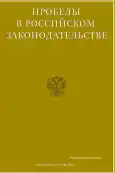General Characteristics of the Current Prohibitions and Restrictions on the Placement of Industrial Facilities
- Authors: Krauze V.I.1
-
Affiliations:
- ILM Advisors, LLC
- Issue: Vol 15, No 3 (2022)
- Pages: 174-182
- Section: Articles
- URL: https://journal-vniispk.ru/2072-3164/article/view/147495
- ID: 147495
Cite item
Abstract
The purpose of the study. The author provides a brief overview of the current prohibitions and restrictions on the placement of industrial facilities Legal measures of environmental protection in the placement of industrial facilities in the form of legislative restrictions and prohibitions should be analyzed at the stage of the placement of the facility, before engineering the facility in order to save investors' money and prevent the conduct of economic activities that have a negative impact on the territories where it is prohibited or restricted. Most restrictions and prohibitions are established in relation to certain categories of land, as well as in relation to components of the natural environment - for the protection of water, flora and fauna, atmospheric air, soil, and subsoil. It is concluded that the regulation of the placement of industrial facilities at territories with the presence of dangerous natural factors - permafrost, harmful effects of water, karst phenomena, landslides and others, is carried out within the framework of regulatory and technical documents and departmental regulatory legal acts in the absence of appropriate restrictions and prohibitions established at the level of federal laws. The placement of industrial facilities at territories with risk of occurrence and/or activation of hazardous natural processes and phenomena, as well as territories with the spread of specific and permafrost soils should be carried out on the basis of an assessment of these risks, including within the framework of the environmental impact assessment (EIA) procedure and during the preparation of engineering survey materials. It is necessary to legislate the conditions, restrictions and prohibitions on the placement of industrial facilities in territories characterized by the presence of natural hazards and processes.
Full Text
##article.viewOnOriginalSite##About the authors
Victoria Igorevna Krauze
ILM Advisors, LLC
Email: krauze.vi@yandex.ru
High-Researcher doctorem, Senior Associate, Department of legal support Moscow, Russia
References
- Abanina E. N. Prohibitions in environmental law / / Chapter in the monograph "Prohibitions in law and legal policy: general theoretical and sectoral aspects" / edited by A.V. Malko. M.: Publishing House: RIOR Publishing Center. 2018. 377 p.
- Vasilyeva M.I. On methods, means and methods of legal regulation of environmental relations // Environmental Law, 2009, No. 2/3, Special Issue
- Volkov G.A. Levels of regulatory regulation of environmental relations // Environmental law. 2018. No. 6. p. 5
- Kruglov V.V. Organizational and legal problems of environmental protection in industry in the modern period : dissertation... Doctors of Law : 12.00.02, 12.00.06. - Yekaterinburg, 1999. - 319 p
- Malko A.V. Incentives and restrictions in law (theoretical and informational aspect): dis. ... cand. jurid. sciences'. - Saratov, 1995. - pp. 99-100
- Petrov V.V. The concept of environmental law as a legal community, science and academic discipline // The concept of environmental law: Materials of the Round table (April 1987) // Vestn. Moscow. un-ta. Ser. 11. Law. 1987. No. 5. p. 37.
- Elpiner L.I., Dzyuba A.V. Medical and ecological aspects of the degradation of the permafrost zone: the problem of paleovirus contamination. Hygiene and sanitation. 2017; 96(8): 706-711.
Supplementary files








